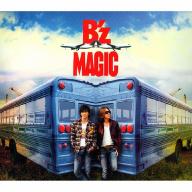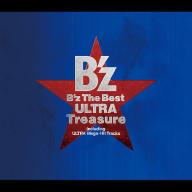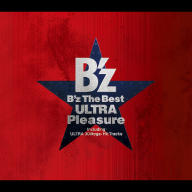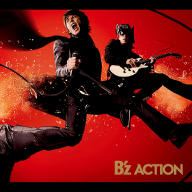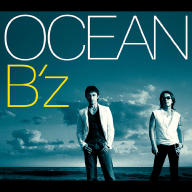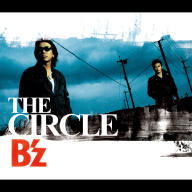B'z were started in 1988 by guitarist Matsumoto, who played as a session musician for popular bands TM Network and Mari Hamada and released a solo album, Thousand Wave, that was well received by critics. Matsumoto decided to pass the vocal duties to someone else and, by means of a newspaper ad, robbed the Japanese education world of an aspiring math teacher named Koshi Inaba, who became the vocalist of the newly formed duo that picked the moniker B'z. As Matsumoto explained later, they wanted to do a little alphabet play and name themselves A'z, but then decided it sounded too much like "AIDS" and settled for the next letter.
The bandmembers proved their seriousness right away, refusing to tour in support of their first album on the grounds that they didn't have enough material for the fans, and thus recording their second LP, Off the Lock, right after their eponymous debut (1988) and embarking on their first tour -- dubbed Live Gym, which became a template for all of their subsequent tours -- in 1989. Soon afterwards B'z reached the top: the single Taiyou No Komachi Angel from their third album, the fittingly named Break Through (1990), scored first place on the national charts and signaled the beginning of a steady tradition -- every single that B'z have released since has shot to number one. B'z, however, weren't content simply to rest on their laurels, and after their fourth album, Risky, they began their stylistic shift, moving from the poppy dance-rock of the '80s to a harder sound that first appeared on In the Life (1991) and flourished on Run (1992). That didn't damage their sales, and B'z went on experimenting, releasing a very bluesy double CD, The 7th Blues (1993), that was actually meant to "weed out" casual listeners from their fan base.
In 1995, B'z made a return to pop/rock (blended with AOR) that proved triumphant -- their eighth album, Loose, sold three million copies, and the band played a set of shows in the domes of Tokyo, Osaka, and other big cities, gathering 30,000 to 50,000 people each time. Inaba also managed to sneak a solo album into the schedule, released in 1997 to a huge success -- a feat that both bandmembers would since repeat every few years. After that, B'z had no need to support their popularity for a while -- they took their time in 1998-1999 to work on solo projects (Matsumoto's Knockin' T Around featured the 1999 Formula One theme song), while their best-of collections Treasure and Pleasure were crushing sales records in Japan. Their next album, Brotherhood, was out in 1990, and its follow-up, Eleven, was released the next year after a number of gigs including a Budokan stint, with the following promo tour not limited to Japan, but also featuring successful shows in Taiwan and Hong Kong.
The group's international expansion continued in the 2000s. In 2002, B'z played together with Aerosmith in the Japan/South Korea World Cup soccer festivities; their lineup for the tour promoting their 12th album, Green (2001), featured Billy Sheehan (former Mr. Big bass player) and drummer Shane Gaalaas, and the tour itself had a number of U.S. dates in which they opened for Aerosmith. B'z returned to America in 2003 with another album (Big Machine, 2003), touring the U.S. and Canadian West Coast, and in 2004 a Matsumoto solo effort was released in Europe as well as Japan. Still, B'z mainly stuck to their homeland, and with good reason, since their mid-2000s efforts -- The Circle (2005), Monster (2006), and Action (2007) -- enjoyed steady success, their live shows still sold out domes, and tours gathered audiences of hundreds of thousands. In 2007, right before their 20th anniversary, B'z truly attained their international certificate of success, becoming the first-ever Asian inductees into Hollywood's Rock Walk on Sunset Boulevard, owing this to the recommendation of Steve Vai, with whom they also toured in Japan. ~ Alexey Eremenko, Rovi



